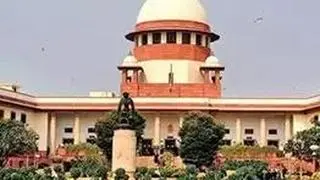The Centre has promulgated an ordinance that reverses the SC’s decision to restore the jurisdiction of services to the Delhi Government. Although the Congress has not yet joined the Aam Aadmi Party (AAP)’s efforts to gather Opposition parties in order to defeat the ordinance in Parliament, the party’s senior leader and leading lawyer P. Chidambaram tells businessline that the ordinance does not overrule the SC’s judgement.Excerpts from the interview:
The SC said the Delhi Government has control over services, whereas the Centre has brought an ordinance reversing the position and made the Lt Governor again in charge of services. Can you explain the legal position?
There were two judgements. The first judgement in 2018 interpreted Article 239AA and said that the Lt Governor is bound by the aid and advice of the Council of Ministers of the Delhi Governor except in three matters – police, public order and land.
That judgment did not specifically go into who will control the services. But it was implied that services in respect of all subjects other than police, public order, and land would remain with the Union Territory Government. The matter was specifically raised in another case and two judges bench expressed different views. One judge held that it would follow the same principle that was laid out in the 2018 judgement but the other judge said that the services will remain entirely with the Central Government.
This question was, therefore, referred to a larger bench and five judges held that, and it came as no surprise to some of us, they followed the principle laid down in the earlier judgement and said all services, except relating to police, public order, and land, will fall under the jurisdiction and control of the Council of Ministers. It is to get over this judgement that the ordinance has been passed.
They think that with this ordinance, they have gotten over the judgement. Whether they have achieved that objective or not is a moot question. It will go back to the Supreme Court. There are legal scholars who believe that the ordinance does not, in effect, overrule the judgement or change the legal position. The judgement interpreted Article 239AA. The ordinance does not amend, and obviously, the ordinance cannot amend Article 239AA.
Let us assume that the ordinance will be replaced by a law. Let us assume that it is passed by Parliament, it will still not dilute or negate the principle contained in Article 239AA. Therefore, legal scholars believe that this ordinance is contrary to Article 239AA as interpreted by the Supreme Court and would, therefore, be struck down. So, we will have to wait and see what happens in Parliament, whether they bring replacement legislation and then what happens in the Supreme Court, where that legislation may get challenged.
Also read: Centre issues ordinance: New authority to decide transfer, postings in Delhi
There is a specificity to Delhi and the Centre’s argument is that the global experience has been that the jurisdictional control in capital cities remains with the Central Government…
AAP is not the first government in the National Capital Territory of Delhi. There have been previous governments. There was the Shiela Dikshit government for 15 years. There was a short-lived government of Sushma Swaraj. There have been other governments headed by BJP leaders. Therefore, if Article 239AA has worked so far, what has changed that it would not work with the AAP government? It’s not the first government after 239AA has been amended. This is a specious argument. If the AAP government violates Article 239AA as interpreted by the Supreme Court, certainly it can be curbed or curtailed or the Court can be invited to pronounce on that. However, Article 239AA has worked for many many years, and there is no reason that it cannot work anymore.
In effect, the Centre has overruled the SC and running Delhi through the Lt. Governor after the ordinance, isn’t it?
The government has promulgated an ordinance. The government is naturally concluding that the law has once again been changed in favour of the Lt. Governor. As long as the ordinance is not stayed or struck down or allowed to lapse, the government would continue to believe that it has changed the law and the law has restored control of the services to the LG. So, I am surprised by what the government or the LG has done in the last few days. We will have to wait and see what kind of legislation replaces the ordinance, what is challenged in the Supreme Court, and what is the pronouncement of the Supreme Court.
Also read: Political brinkmanship in Delhi
How does such an attitude reflect on the principle of federalism?
Article 239AA is a part of the Constitution. Delhi is a Union Territory like Lakshadweep, Andaman and Nicobar, and Dadra and Nagar Haveli. But they do not have legislative assemblies. Whatever the reason, Parliament decided to have a legislative assembly, an elected government, and a Council of Ministers in Delhi and gave the power to the Council of Ministers to aid and advise the Lt. Governor.
As long as Article 239AA is retained in the Constitution, it is part of the federal system that should apply to Delhi also. But this government has transgressed and violated the federal structure in many ways, direct and indirect, in respect of even the full-fledged states. So, I am not surprised that they are violating the federal principle as far as Delhi is concerned.
Let me give you an example, cooperative societies and cooperative banks have always been under the control of the States. What was the pressing need now to indirectly and directly, in many cases, assert control over the cooperative sector? According to me, that is a clear violation of the federal structure. I think that is being challenged by some States. I don’t know at what stage these petitions are. But if they interfere in the cooperative sector that has all along, for nearly 70 years, been exclusively under the control of the State governments, I am surprised that they are interfering with the federal structure as far as Delhi is concerned.
So, would the Congress support AAP in voting against the ordinance in Parliament?
I cannot answer that question. That is a question addressed to the leadership of the various parties, including the Congress party. That is a question for the Congress president. You have asked me as a lawyer and a believer in federalism and I have given you a view. But does not necessarily lead to the conclusion that in a given situation, the Congress or any other party should support AAP.








Comments
Comments have to be in English, and in full sentences. They cannot be abusive or personal. Please abide by our community guidelines for posting your comments.
We have migrated to a new commenting platform. If you are already a registered user of TheHindu Businessline and logged in, you may continue to engage with our articles. If you do not have an account please register and login to post comments. Users can access their older comments by logging into their accounts on Vuukle.